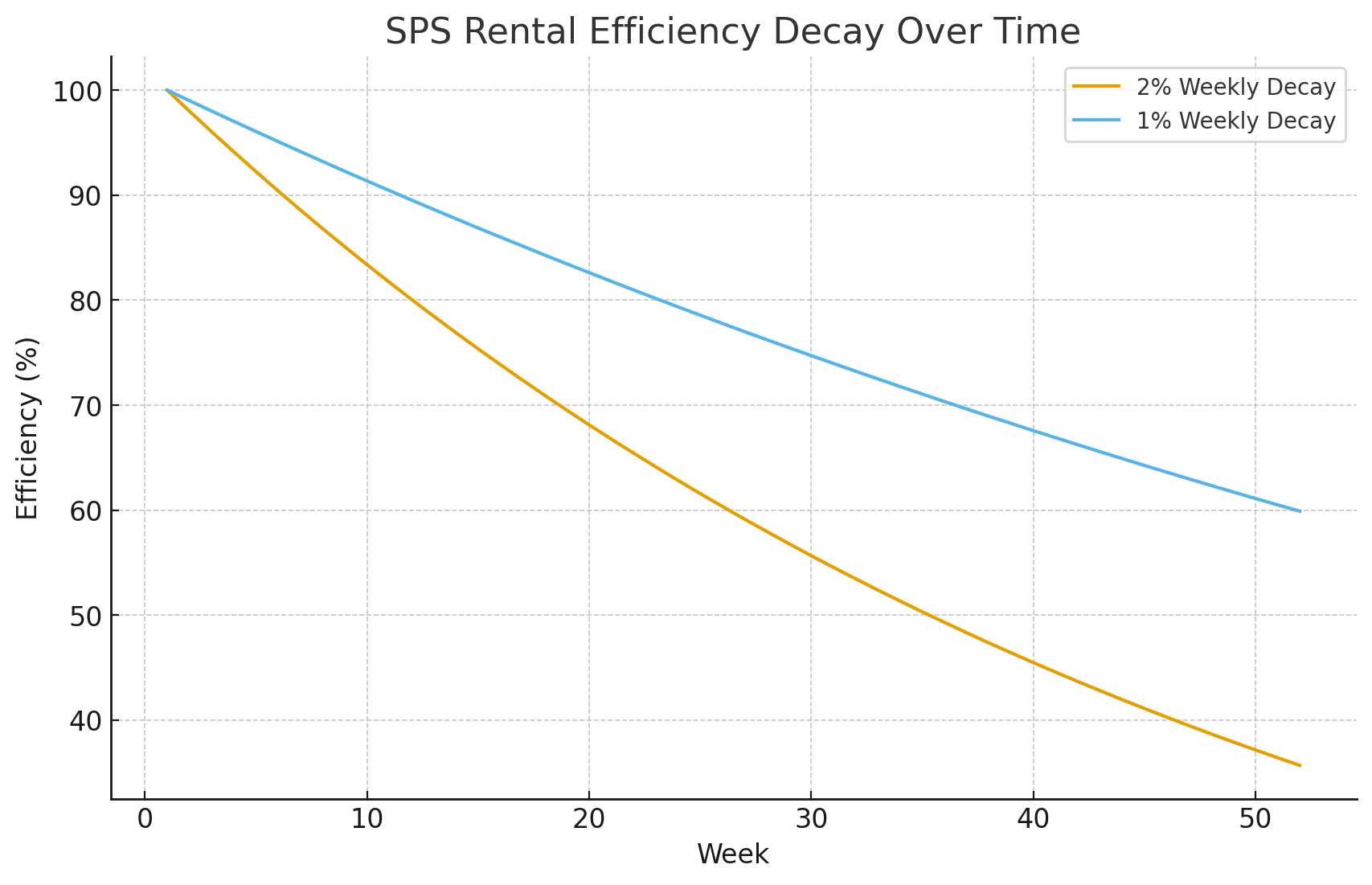
Summary
This proposal introduces a gradual efficiency tapering mechanism for rented and delegated SPS used in gameplay reward calculations. The goal is to strengthen the SPS economy, support smaller holders, and reduce excessive sell pressure — while keeping full rental freedom and market stability.
Under this system, the reward efficiency of rented and delegated SPS would decrease by 1% per week, applied globally and uniformly. It’s a smooth and predictable transition that encourages staking and sustainability without disrupting the market.
👉 Note: This proposal is still a work in progress (WIP). I’m publishing this draft here to gather your thoughts and feedback before officially submitting it for a DAO vote.
📖 Background and Rationale
SPS rentals were designed to improve accessibility and participation. Over time, however, the system has created an imbalance:
📉 Rental prices have dropped to around 0.001 SPS, making renting far cheaper than staking.
🔄 Many players prefer renting to buying, which reduces buy pressure.
💸 Gaming rewards earned through rented SPS are often immediately sold, creating constant sell pressure on the token.
The result is a structure that rewards short-term extraction more than long-term engagement.
Raising the rental floor or removing rentals altogether would be too disruptive. This proposal offers a balanced and gentle alternative that allows natural adaptation through time-based tapering.
⚙️ Proposal Details
A 1% weekly decay would apply to all rented and delegated SPS in gameplay reward calculations.
The decay is global, based on calendar time, not individual rental dates.
When SPS is newly rented or delegated, it starts at the current efficiency level.
The SPS token itself is not modified — only the reward contribution changes gradually.
Example of 1% weekly decay:
Week 1 → 100% efficiency
Week 2 → 99%
Week 3 → 98.01%
Week 4 → 97.03%
… and so on
Rented and delegated SPS will continue to function normally in all gameplay mechanics; only their reward efficiency will gradually adjust over time.
📊 Visual Representation
Below is a visualization of the 1% weekly tapering effect over 52 weeks, compared to a 2%, that was the initial thought. Even after one year, efficiency remains near 60%, ensuring accessibility and gradual change.

🌍 Expected Results
✅ Smooth, progressive adjustment without sudden disruption ✅ Reduced sell pressure, improving SPS stability ✅ Gradual incentive shift toward staking ✅ Continued access for smaller players and guilds ✅ A healthier, fairer reward structure for the whole ecosystem ✅ The long life span of the tapering and smooth reduction in efficiency allows players to transition naturally from renting to holding, without the immediate need to buy SPS or face sharp gameplay disadvantages
Over time, the tapering system encourages organic growth, greater staking participation, and a more sustainable token economy that benefits everyone — from new players to large holders.
🧠 Implementation
Taper rate: 1% per week (adjustable via future DAO votes)
Activation delay: 2 weeks after DAO approval (grace period)
Technical complexity: Low — simple adjustment to reward logic
Transparency: The efficiency rate and taper schedule will be visible to all players
🗳️ DAO Vote Options
YES – Approve the 1% weekly SPS Rental Efficiency Tapering Mechanism, applied to all rented and delegated SPS in gameplay rewards, activated two weeks after approval.
NO – Keep the current rental and delegation systems unchanged.
🏁 Conclusion
This proposal offers a measured, inclusive, and sustainable path forward for the SPS ecosystem. It keeps rentals open and accessible while progressively strengthening staking and long-term value.
Through small, predictable adjustments, we can reduce sell pressure, stabilize rewards, and ensure that the SPS economy grows stronger for everyone — from major stakeholders to the newest players entering the game.
